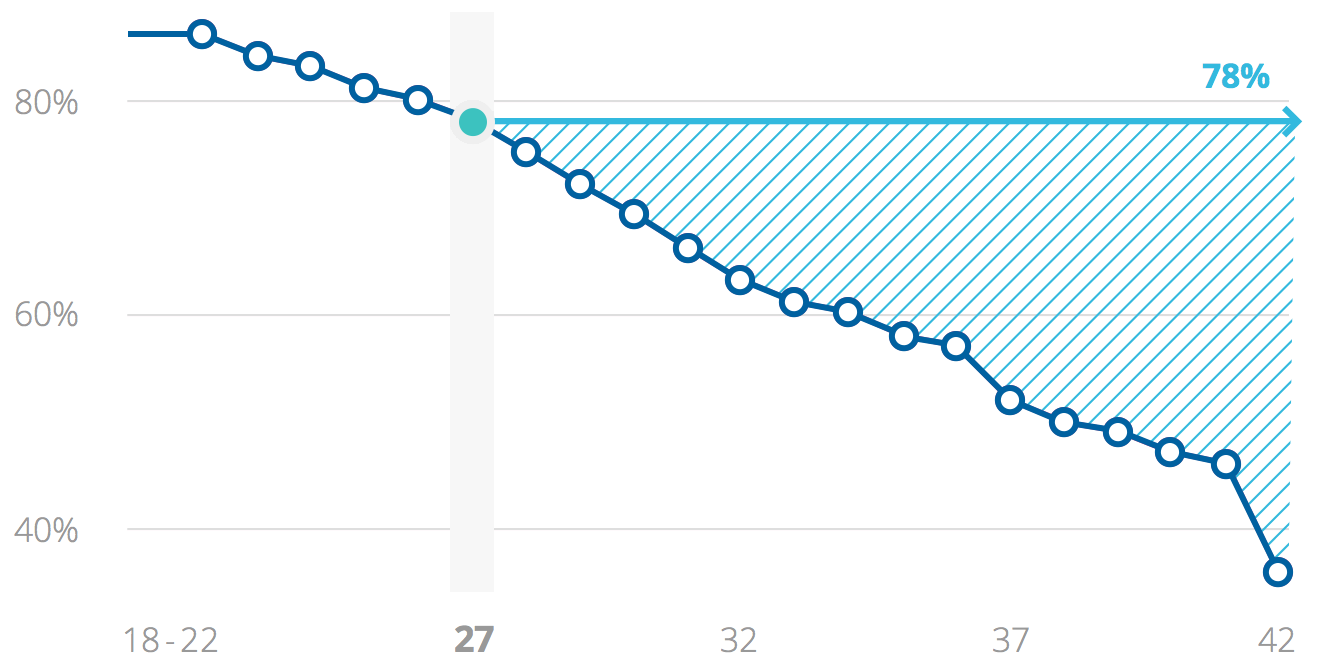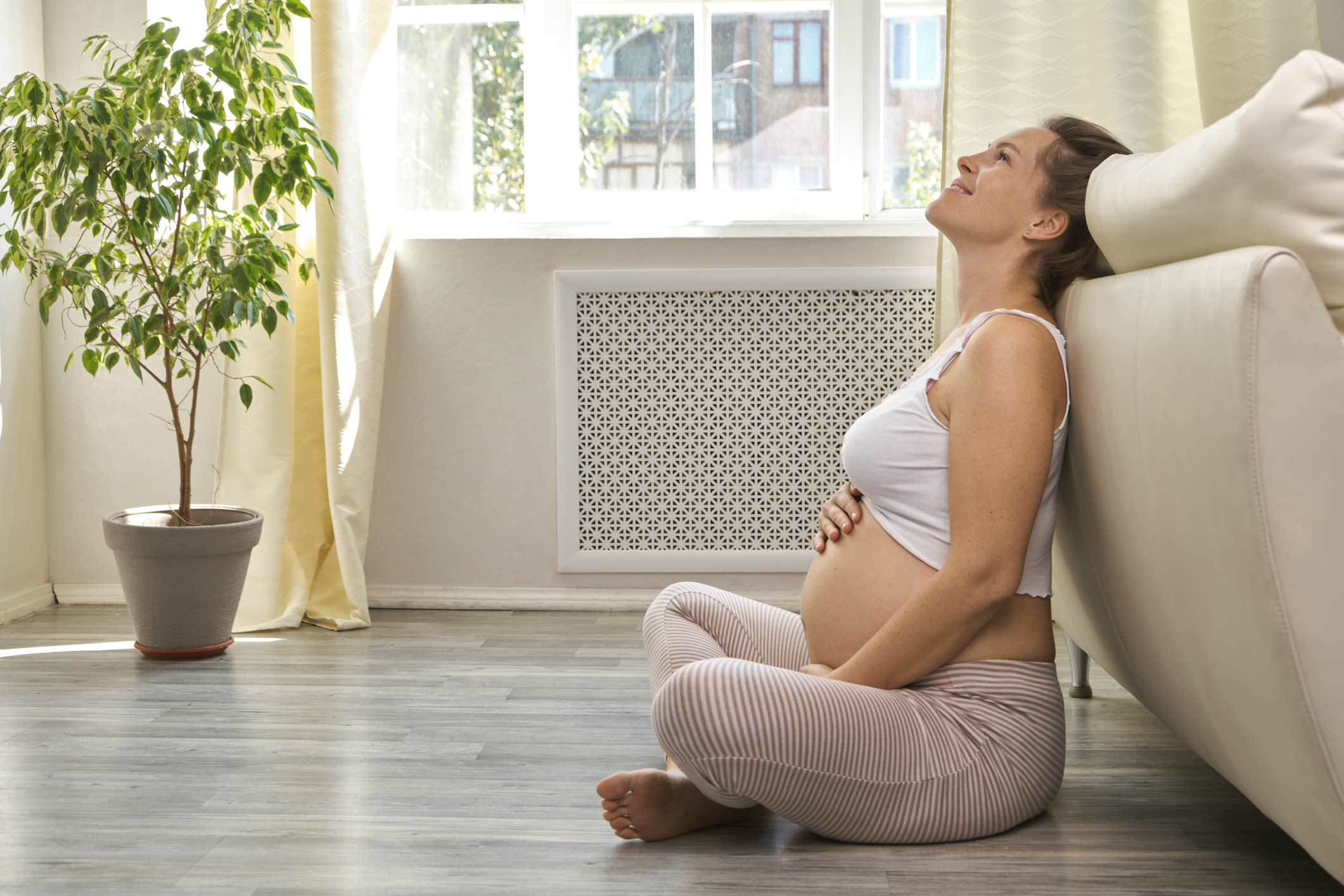Regardless of a couple’s age, in today’s society, the decision to bring a child into the world depends on many factors and is often perceived as courageous, or of postponing projects or the need for a more favourable financial situation before taking this step. This may be why couples are putting off the decision until later, to the extent that pregnancy in their 40s is becoming increasingly common.
This can be seen in both global statistics and in the fertility data for Spain. Moreover, postponing your plans to become a mother in the future doesn’t just depend on economic stability, lifestyle or day-to-day certainty; it also depends on advances in medical research. Now, if a woman wants to become a mother after the age of 40, advances in science mean that the chances of pregnancy have increased to the point where having a child at the age of 40 or older is no longer impossible, but has become a reality.
Chances of pregnancy at 40 and after 40
Age
Without egg freezing
With egg freezing

Recommended age limit: 40
Chance of pregnancy
For a long time, medicine regarded a woman as too old to conceive a child (older woman) after the age of 35. As we showed in the article on the chances of pregnancy according to age, from the age of 39, the cumulative probability of pregnancy is less than 50%, while the probability of pregnancy at 40 is 47% and 36% at the age of 42.
There is a biological explanation for this. As time goes by, there is a natural decrease in a woman’s fertility. This reproductive potential in women, based on the number and quality of oocytes, is known as ovarian reserve.
Although it is possible to get pregnant at 40, in the case of women, the number of eggs and, above all, their quality, decreases significantly after the age of 35, which is why many patients begin to seek help by resorting to treatments such as in vitro fertilisation, artificial insemination and other assisted reproduction techniques. This is because, on average, women have between 300,000 and 500,000 oocytes at puberty, whereas at the age of 37 this drops to 25,000 and then falls dramatically to 1,000 by the age of 51.
In addition, over time, the ovary and its eggs also age, causing the quality of the oocytes to deteriorate and resulting in an increase in genetic problems. For this reason, we now know that fertility in women begins to decline from the third decade onwards and becomes more pronounced at around the age of 38. Therefore, although there are cases of natural pregnancies in women after the age of 40, these are not frequent situations. That is why science has evolved to offer this possibility to more women.
Pregnancy symptoms at 40
The symptoms of pregnancy in your 40s are not very different from pregnancy symptoms at any other age.
Typical symptoms are:
- Constipation and bloating.
- Pelvic and lower back (lumbar region) pain.
- Feelings of nausea, heartburn and vomiting.
- Pain, tightness and swelling in the breasts (mastitis).
- The need to urinate frequently.
But despite the similarities, other symptoms may be more of a challenge for this age group.
Some women over the age of 40 report joint and bone pain. This is probably due to the fact that, with the passage of time, it is normal for our body’s joint lubrication and bone mass to diminish.
Others report a more noticeable feeling of fatigue. However, there are more significant symptoms that your doctor should monitor, as they can pose a real risk to your pregnancy.
Risks of pregnancy in your 40s
It is possible to have a baby safely at the age of 40. However, any pregnancy (assisted or natural) after that age will be regarded as high risk.
That’s why your doctor should closely monitor you and your baby clinically in order to detect at an early stage the appearance of any risk symptoms, such as:
- High blood pressure: this can increase the risk of a pregnancy complication called pre-eclampsia.
- Gestational diabetes: raised blood glucose levels during pregnancy.
- Birth defects: due to the ageing of the ovary, there is a greater likelihood of genetic alterations that may be linked to miscarriages or Down’s syndrome in the baby.
- The baby has a low birth weight.
There are steps you can take to reduce your chance of developing high blood pressure and gestational diabetes. Regular, gentle exercise and a balanced diet will help keep you and your baby healthy.
Does having a second or third pregnancy at 40 change anything?
Having a second pregnancy in your 40s, or a third, shouldn’t necessarily change anything. If you’ve had uncomplicated pregnancies and births, and you’re fit and healthy, you and your baby are likely to be fine too.
In the case of previous pregnancies with associated complications such as placenta previa, gestational diabetes, high blood pressure, pre-eclampsia, and so on, your doctor will carry out a more controlled follow-up with regard to the development of the current pregnancy.
Fertility treatments for women over the age of 40
Normally, it can take some time to get pregnant, regardless of your age. But if you want to get pregnant after the age of 40 and have been trying for six months without succeeding naturally, it may be time to see a doctor who specialises in fertility.
At Eugin, our fertility specialists will first perform the necessary diagnostic tests to find out if there are any factors that are affecting your ability to get pregnant. These fertility tests for women at 40 may include ultrasound scans to look at the uterus and ovaries, or blood tests to check ovarian reserve, as well as testing of the male partner, if applicable, to rule out different causes of male infertility.
Depending on these results, there are different treatment options:
- Artificial insemination: This technique involves placing selected sperm from either your partner’s or an anonymous donor’s sperm sample inside your uterus. This procedure tends to work best for women under the age of 40. (enlazar con tasas éxito)
- In vitro fertilisation: This is a laboratory method that allows us to fertilise an egg with sperm outside the uterus, in which one of these combinations can be used depending on your state of health, that of your partner and your personal situation:
- IVF using your own eggs: using your own eggs and your partner’s sperm.
- IVF using donor sperm (and your own eggs).
- Egg donation, using donor eggs and your partner’s sperm.
- IVF with donated eggs and sperm.
- ROPA Method, for female couples where one provides the egg and the other carries the pregnancy.
What are the benefits of pregnancy after the age of 40?
A woman’s maturity can, in some respects, be viewed as an advantage, as she is better prepared for new challenges. On the one hand, she may have already built up her career and can devote more time to raising her children, or her financial situation may be more favourable, thus ensuring a better quality of life.
In addition, some research has shown other potential benefits of having a child after 40 for both mother and child, including:
- Reduction of cognitive impairment in women.
- Longer female survival (a longer life).
- Improved educational outcomes for children
The most important thing is to talk to your gynaecologist about what else to expect during pregnancy based on your age and general health.
There are different options for women when planning their fertility, including freezing their eggs at a younger age to preserve them for the future.
Although it is not as easy to achieve as it is at a younger age, with the right knowledge and care, it is still possible to have a healthy pregnancy after 40. We want to help you become a mother by taking care of your health and your baby’s. If you have any doubts, feel free to contact us and our fertility experts will study your case.






